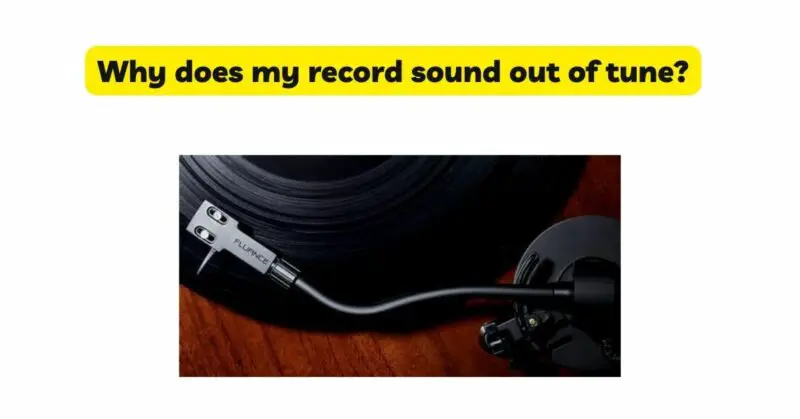Listening to vinyl records can be a delightful and immersive experience, but what happens when the music sounds out of tune? In this article, we will explore the common reasons behind records sounding out of tune, the impact of these issues on the listening experience, and potential solutions to restore accurate pitch and enjoy your vinyl collection to the fullest.
I. Understanding Pitch and Intonation
- Pitch Basics: A brief explanation of pitch, which refers to the perceived highness or lowness of a sound, and how it is influenced by factors like frequency and musical notes.
- Intonation in Music: Intonation refers to the accuracy of pitch in music, ensuring that all musical elements, including instruments and vocals, are in tune with each other.
II. Common Causes of Out-of-Tune Records
- Incorrect Turntable Speed: Incorrect turntable speed, either too fast or too slow, is a common cause of records sounding out of tune. This can be due to mechanical issues or incorrect adjustment.
- Incorrect Pitch Adjustment: Some turntables allow pitch adjustment, which can inadvertently result in the record playing at the wrong pitch if not properly set.
- Vinyl Pressing Variations: Inaccuracies during the vinyl pressing process can cause slight variations in pitch across different copies of the same record.
- Wear and Damage: Worn or damaged stylus, cartridge, or tonearm components can affect the accurate tracking of the grooves, leading to pitch inconsistencies.
III. Identifying Out-of-Tune Playback
- Trusting Your Ears: Listening attentively to the music and paying attention to any noticeable pitch discrepancies is crucial in identifying out-of-tune playback.
- Comparing with Other Sources: Comparing the vinyl playback with other sources, such as digital versions or other records, can help determine whether the issue lies with the record or the turntable setup.
IV. Solutions for Correcting Out-of-Tune Playback
- Calibrating Turntable Speed: Properly calibrating the turntable speed using a strobe disc or a speed measurement tool ensures accurate playback and correct pitch.
- Pitch Adjustment: If your turntable allows for pitch adjustment, understanding the correct adjustments and ensuring precise settings can restore accurate pitch.
- Stylus and Cartridge Maintenance: Regular maintenance and cleaning of the stylus and cartridge help ensure optimal tracking and accurate playback.
- Tonearm Setup and Alignment: Proper setup and alignment of the tonearm ensure that the stylus tracks the grooves accurately, minimizing pitch deviations.
- Seeking Professional Assistance: If the issue persists or if you lack the expertise to troubleshoot, seeking assistance from a professional turntable technician can help identify and resolve the problem.
V. Preventive Measures
- Proper Storage: Storing records upright and in a controlled environment with stable temperature and humidity levels helps preserve their condition and minimize potential pitch-related issues.
- Regular Maintenance: Regular cleaning and maintenance of your turntable components, including the stylus, cartridge, and tonearm, can prevent wear and damage that may affect pitch accuracy.
Conclusion
While an out-of-tune record can be disappointing, understanding the causes and solutions can help restore accurate pitch and enhance your vinyl listening experience. By addressing issues related to turntable speed, pitch adjustment, component wear, and damage, you can ensure that your records sound true to their intended pitch. Regular maintenance and calibration, along with careful storage and handling practices, will help preserve the integrity of your vinyl collection and allow you to fully enjoy the beauty of analog music. Remember, with the right knowledge and care, you can keep the tunes in tune on your beloved records.


